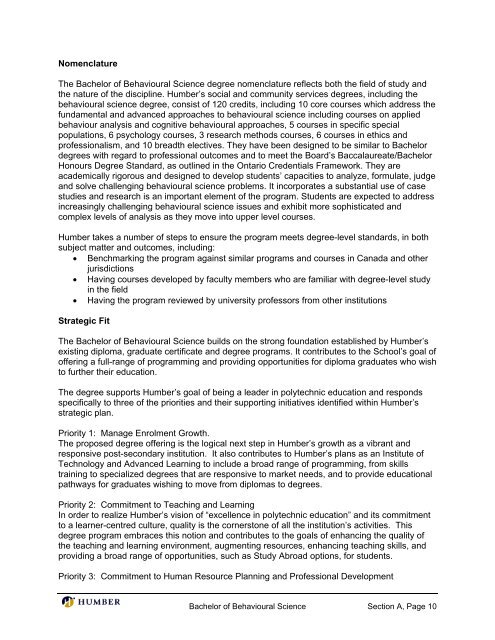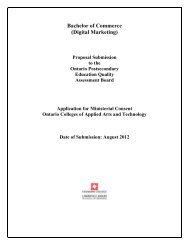Bachelor of Behavioural Science - Postsecondary Education Quality ...
Bachelor of Behavioural Science - Postsecondary Education Quality ...
Bachelor of Behavioural Science - Postsecondary Education Quality ...
You also want an ePaper? Increase the reach of your titles
YUMPU automatically turns print PDFs into web optimized ePapers that Google loves.
Nomenclature<br />
The <strong>Bachelor</strong> <strong>of</strong> <strong>Behavioural</strong> <strong>Science</strong> degree nomenclature reflects both the field <strong>of</strong> study and<br />
the nature <strong>of</strong> the discipline. Humber’s social and community services degrees, including the<br />
behavioural science degree, consist <strong>of</strong> 120 credits, including 10 core courses which address the<br />
fundamental and advanced approaches to behavioural science including courses on applied<br />
behaviour analysis and cognitive behavioural approaches, 5 courses in specific special<br />
populations, 6 psychology courses, 3 research methods courses, 6 courses in ethics and<br />
pr<strong>of</strong>essionalism, and 10 breadth electives. They have been designed to be similar to <strong>Bachelor</strong><br />
degrees with regard to pr<strong>of</strong>essional outcomes and to meet the Board’s Baccalaureate/<strong>Bachelor</strong><br />
Honours Degree Standard, as outlined in the Ontario Credentials Framework. They are<br />
academically rigorous and designed to develop students’ capacities to analyze, formulate, judge<br />
and solve challenging behavioural science problems. It incorporates a substantial use <strong>of</strong> case<br />
studies and research is an important element <strong>of</strong> the program. Students are expected to address<br />
increasingly challenging behavioural science issues and exhibit more sophisticated and<br />
complex levels <strong>of</strong> analysis as they move into upper level courses.<br />
Humber takes a number <strong>of</strong> steps to ensure the program meets degree-level standards, in both<br />
subject matter and outcomes, including:<br />
Benchmarking the program against similar programs and courses in Canada and other<br />
jurisdictions<br />
Having courses developed by faculty members who are familiar with degree-level study<br />
in the field<br />
Having the program reviewed by university pr<strong>of</strong>essors from other institutions<br />
Strategic Fit<br />
The <strong>Bachelor</strong> <strong>of</strong> <strong>Behavioural</strong> <strong>Science</strong> builds on the strong foundation established by Humber’s<br />
existing diploma, graduate certificate and degree programs. It contributes to the School’s goal <strong>of</strong><br />
<strong>of</strong>fering a full-range <strong>of</strong> programming and providing opportunities for diploma graduates who wish<br />
to further their education.<br />
The degree supports Humber’s goal <strong>of</strong> being a leader in polytechnic education and responds<br />
specifically to three <strong>of</strong> the priorities and their supporting initiatives identified within Humber’s<br />
strategic plan.<br />
Priority 1: Manage Enrolment Growth.<br />
The proposed degree <strong>of</strong>fering is the logical next step in Humber’s growth as a vibrant and<br />
responsive post-secondary institution. It also contributes to Humber’s plans as an Institute <strong>of</strong><br />
Technology and Advanced Learning to include a broad range <strong>of</strong> programming, from skills<br />
training to specialized degrees that are responsive to market needs, and to provide educational<br />
pathways for graduates wishing to move from diplomas to degrees.<br />
Priority 2: Commitment to Teaching and Learning<br />
In order to realize Humber’s vision <strong>of</strong> “excellence in polytechnic education” and its commitment<br />
to a learner-centred culture, quality is the cornerstone <strong>of</strong> all the institution’s activities. This<br />
degree program embraces this notion and contributes to the goals <strong>of</strong> enhancing the quality <strong>of</strong><br />
the teaching and learning environment, augmenting resources, enhancing teaching skills, and<br />
providing a broad range <strong>of</strong> opportunities, such as Study Abroad options, for students.<br />
Priority 3: Commitment to Human Resource Planning and Pr<strong>of</strong>essional Development<br />
<strong>Bachelor</strong> <strong>of</strong> <strong>Behavioural</strong> <strong>Science</strong> Section A, Page 10
















